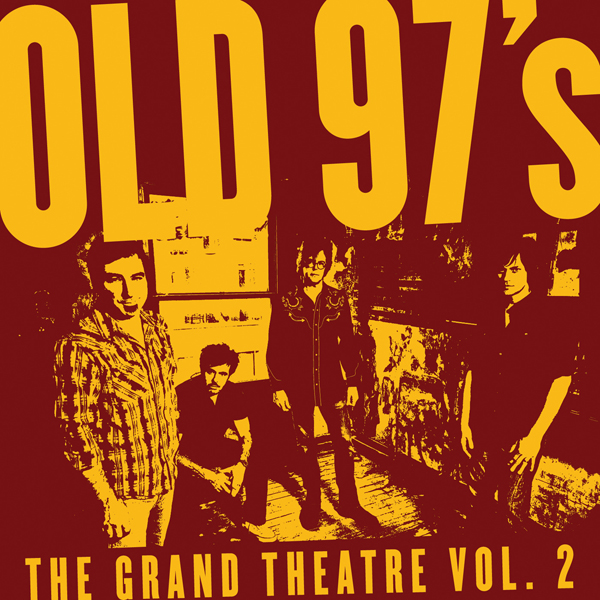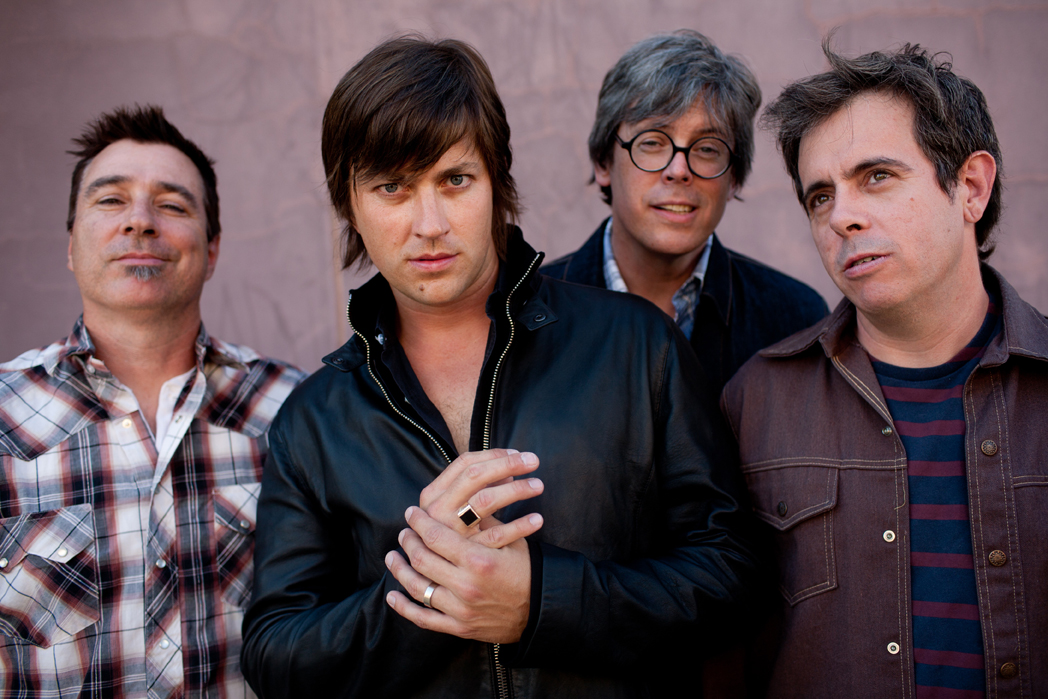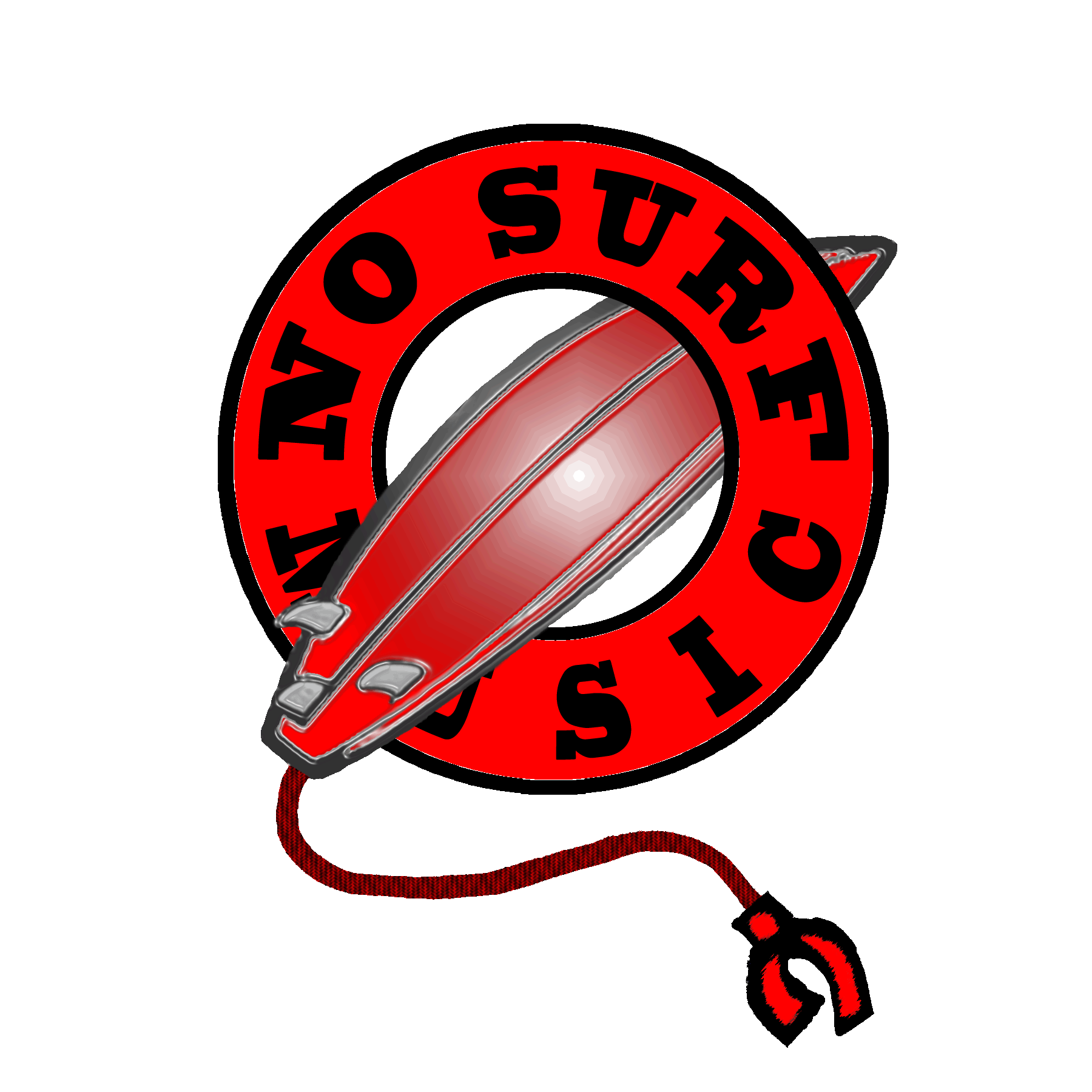
The Lowdown:
July 6, 2011
Old 97's: The Grand Theatre, Volume 2
by Jason D. 'Diesel' Hamad
Same old guys, same old photo. I guess with the second half of a double album you don't have to do new publicity? (l-r) Ken Bethea, Rhett Miller, Murry Hammond, Philip Peeples. Photo by Allison Smith.
Usually with a big release from a band that is right in No Surf’s wheelhouse—like Old 97’s—we’d have the review set to go right on drop date. The write-up for The Grand Theatre Vol. 2 took some extra effort, however. Everyone who I’d talked to loved the album, but I just wasn’t feeling it. I decided I had to give it an extra half-dozen or so listens before I could say anything one way or another, and I’m glad I did. It’s still far from my favorite Old 97’s album, but it did grow on me.
One thing that annoyed me right off the bat was the cover. It’s completely different than the awesome stage scene from Volume One, instead featuring a half-tone portrait of the band that comes in one of four different color schemes. The correct choice—if one really wants to consider these two discs as one work—would have been to reverse the image from the first album, showing the view from the stage and all the empty seats of the glorious theater. But along with the strange naming convention of “Volume One” vs. “Vol. 2,” the cover choice seems to be an acknowledgement that despite being recorded in the same sessions, these really are very different albums. At first, I thought the idea of splitting what was essentially a double album into two releases was just a ridiculous label scheme a la “Kill Bill” where one coherent work was hacked in two simply to increase sales. This is really not the case, however. While they were written essentially at the same time and both albums attempt to recreate the famous Old 97’s on-stage vibe, they feature distinctly different music, Volume One more along the lines of traditional 97’s sound and Volume 2 exploring more experimental ideas, including garage band and Brit poppish sounds. At best the second is a sequel, not a split set, and they really should have been marketed as separate entities. But whatever, marketing isn’t my concern; music is.
One problem I had with accessing this album is that every previous Old 97’s release had at least one absolutely outstanding track. Hitchhike to Rhome had the awesome, bluegrassy, original version of “Doreen.” Wreck Your Life had “Victoria,” “Big Brown Eyes” and the revamped version of “Doreen.” Too Far to Care had “Timebomb,” “Barrier Reef” and yet another version of “Big Brown Eyes.” Fight Songs featured “Oppenheimer” and “Murder (Or a Heart Attack).” Satellite Rides had “King of All of the World.” Drag it Up was dominated by “Won’t Be Home.” Blame It on Gravity had “Dance With Me” and “The One.” The Grand Theatre, Volume One had “Champaign, Illinois.” But on Volume 2, to steal a line from Tom Petty’s A&R man, “I don’t hear a single.” That’s not to say there aren’t some good tunes on it—especially after you get to know them a little bit—but there’s just no absolute standouts that compare to those earlier works. Still, it’s a collection of often very good songs and any Old 97’s fan will be happy with the result.
Although it feels like a pirate tune with its a cappella mock-British drinking song introduction and rollicking main portion (not to mention the strangely piritatey language), “White Port” is actually a hobo song. The chorus reads:
I ride the longest, hardest, fastest routes there are to ride,
And all is done with style and grace and white port at my side.
It’s taken from a piece of train-car graffito Murry saw in a picture taken by a friend. It’s like a Woody Guthrie song on meth—complete with yodels—and it’s easily the best song on the album. It does a great job of describing the freedom of the vagabond lifestyle and it’s a fun, rollicking free-for-all that can’t help but be enjoyed.
Old 97’s have a singular talent in making depression sound fun. They’ve always been able to combine melancholic lyrics with upbeat music in a way that inexplicably gels perfectly. The best example of that style exhibited on this album can be found in “Manhattan (I’m Done).” Anyone who’s ever lived in New York knows the strange ability the city has of making you feel alone while swimming in a giant sea of people. It’s fair enough to say that crazy people are drawn to the city, but the city makes a person crazy, too. That’s the case here as the lonely narrator wanders through his giant cage, stalking his girl through the streets and muddling his way through his “saddest of Saturday mornings.” The ending is just as enigmatic as the rest of the song, as he tells the object of his affection:
I was watching you for so long.
Kiss me goodbye once and I’m gone.
Manhattan, I’m done.
Does he mean he’s done with the city? Or the girl? Or that he’s going to take a flying leap into the Hudson? It’s really impossible to tell through the cheery “Belle and Sebastian” guitars (as described by Ken), and maybe that’s the way it’s supposed to be.
With its lively screaming guitars and loose feeling music “I’m a Trainwreck” is a kinda funky Dallas version of Brit pop. It’s one of those touching love stories where two majorly fucked up people decide to be fucked up together:
I’m a trainwreck.
So are you.
And if you don’t know where you’re going
Do you mind if I come too?
You wonder what’s the deal.
You’ve gotta fake it till it’s real.
There is no benefit to doubt.
You’ve got to let it all hang out.
Say I love you, what the heck.
I’m a trainwreck.
Too bad it wasn’t written a decade earlier or it could have fit right into the soundtrack for “Fight Club.”
Opening with a ghostly vocal call of “And I tried,” “Brown Haired Daughter” kicks in with a pretty standard Western beat with big, sorrowful, operatic guitar straight out of a white hat vs. dark hat movie duel scene. Metaphorically it’s fitting, because although it’s never quite clear what the story is, it’s obvious that the narrator is in some conflict with the father of the title character. Rhett, playing the bad boy Romeo, explains to dear ol’ daddy that the kids are in love and there’s nothing he can do about it. He emphasises that he’s tried to quit her, saying:
And I tried to leave it all alone,
Send your brown-haired daughter home.
But I can’t,
So I won’t
And you ought to hear my heart curse.
It’s at once defiant and vulnerable, as the suitor isn’t sure he’s worth her trouble and he fears that their relationship might lead to catastrophe:
It’s strange how we are
So safe until we’re sorry
On a dime,
On a dare,
And it’s not my fault she loves me.
Christ on a cracker, some motherfuckers just really need therapy. Like, for instance, our strange little agoraphobic friend from Volume One’s “The Dance Class.” Inexplicably (and unexplained), he has managed to win his girl in sequel song “Perfume,” and still he’s not happy. The problem is he’s still stuck in his apartment, and she’s free to go. It’s a little like “Ruby, Don’t Take Your Love to Town,” except instead of having his balls blown off in ‘Nam, he’s just too chickenshit to go out the door. Far be it for me to belittle someone’s mental problems, but shit, dude, you got the girl, quit your damn whining!
There’s all these girls outside
Wrapped up in winter clothes.
My imagination grows.
I can’t convince my eyes to close.
You’re on the town again
And I’m drownin’ in you bed.
Your perfume is in my head
And it’s drivin’ me, drivin’ me, drivin’ me…
And it’s a beautiful day outside.
All I can say is wherever he’s driving, it ain’t gonna be a long trip.
“No Simple Machine” is not a simple song. The music is straightforward enough, old-school country that would fit in at any dancehall, honky tonk, or country dive. The complicated part is the characters it describes, especially the narrator, who is rather schizophrenically a swaggering cowboy type who solves disagreements with his fists and brags about his staying power in bed, but simultaneously waxes philosophically in a neo-feminist style that would make Mary Wollstonecraft proud. For instance, there's macho lines like:
He said, “Who’s this fool on your arm?”
And I said, “Let me at him!
His bell begs to get rung
And his nose begs to get flattened!”
Just give me one night
To wipe the slate clean.
Yeah, it’s gonna take all night...
Ok, so you're a hothead with a likely over-estimated confidence in your prowess in the sack. Great. That doesn't exactly seem to jive with the line that immediately follow:
’Cause you are no simple machine.
It likewise seems to conflict with the song's opening note:
He said “Can I buy you a drink?”
What he meant was “Can I buy you?”
Yet Rhett seems to make it all work. I don’t know, I guess that’s what they call literary talent. That’s not something I would know about.
One song that is a mix of elation and disappointment may be “The Actor.” It was recorded in one take, and it shows. It has the feel of a garage rehearsal where they’re still trying to work out the kinks, even including Rhett saying “Yeah, let’s just stick with this key and try it like that,” and then counting off the beats as the others try to come in. It’s got some good licks—especially on the guitar—but it seems like the one-shot jam treatment is giving it short shrift. This is especially true because it has some pretty compelling lyrics, which could just as easily be about musicians as actors. In fact, the first lines could apply to a lot of us:
The actor sits in a windowless room
Applying his makeup, remembering his friends.
They’re all dead now or married with children.
It’s the very same thing where the actor’s concerned.
Come to think of it, it could all really apply to a lot of us. Take the lines:
He loves his job, but it’s an awful lot
Of faking his feelings and fumbling around
...
That is life for the next two hours.
Yeah, he is ours beneath the lights.
Change two hours to eight and you’ve got pretty much every shlub who’s ever worked any job anywhere. And like the actor, most of us end up as blackout alcoholics because of it. This song rocks pretty hard and I get that they were going for a spontaneous feel, but still I can’t help thinking it could have been better had they actually rehearsed it once or twice before they cut it.
Other songs of note include “Bright Spark (See What I Mean),” a rocker from start to finish with a crazy fast drumbeat, it tells the story of a man who, like most, is trapped in the doldrums of work-a-day boredom:
We all do the thousand yard stare
Shuffling around. Ain’t goin’ nowhere.
Crowds roll in, and they do it again.
Nothing’s gonna break this routine.
See what I mean?
This has been a recurring motif for Rhett of late, especially on the Grand Theatre albums. This lucky stiff finds redemption, however, when he runs into girl who turns his outlook around. Ok, it’s sappy, but it’s better than a thousand-dollar-a-day coke habit, I guess.
“Marquita” is a quick-tempoed instrumental with a thunderous garage band feel, blazing guitar and ripping drums. It has a bit of Texas barbeque flavor, but tastes more of rocket fuel residue.
The closer, “You Call It Rain,” is an exceptionally cheery little song about being happy whatever your situation, and although it’s not exactly the deepest thought in the world, the bouncy music and beautifully distorted guitar line goes a long way toward making anyone feel better at least for a couple minutes.
I have to disagree with my fellow writers who have been saying things like “album of the year,” and the like. The Grand Theatre, Vol. 2 isn’t that good. But it is a fine little collection of songs that’s sure to get your foot stomping. It’s not Old 97’s best album, either, but it has a lot of entertaining tracks and any Old 97’s fan is sure to enjoy it. And if you’re not an Old 97’s fan, you need to have your head examined. Do everyone a favor and offer our agoraphobic friend a ride to the shrink as long as you’re going, ok?
| mp3 | cd |
|---|---|






